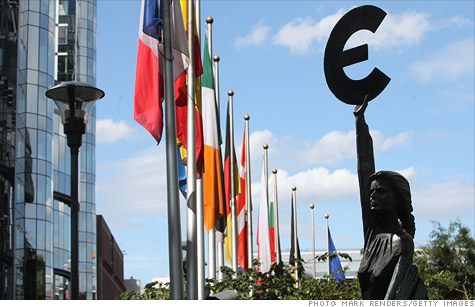Search News

Lawmakers in several key European nations will vote on a proposal to expand the eurozone bailout fund this week.
NEW YORK (CNNMoney) -- As sovereign debt and banking problems continue to swirl in Europe, investors are looking to key votes this week in several euro area capitals on a plan to create some stability.
European leaders agreed in July to overhaul the framework of the European Financial Stability Facility, which was set up in the wake of the 2008 crisis.
The goal is to calm sovereign debt markets by empowering the fund to buy bonds issued by distressed euro area governments directly from investors.
It would be able to do this for nations that do not have an existing bailout program, such as Italy and Spain. Both nations are struggling with unsustainable levels of debt and dim economic prospects.
In addition, the enhanced fund would be able to provide lines of credit to European nations that need to recapitalize troubled banks.
Currently, the €440 billion fund is only able to buy bonds issued by Ireland and Portugal -- the two countries that have already received bailout money from the fund.
The proposed reforms must be approved by the individual governments of all 17 nations that use the euro.
So far, only six countries have ratified the changes, including France, Italy, Spain, Ireland, Luxembourg and Belgium.
This week, the stability fund overhaul will be voted on in Slovenia, Finland, Germany and Austria.
The idea of providing more financial support for euro area nations that overspent is deeply unpopular among voters in northern Europe.
Support from Germany, already the biggest backer of the stability fund, is crucial for the proposed reforms. The lower house of the German Parliament, the Bundestag, will vote on the measure Thursday.
"With no major data due this week the spotlight will be on the vote in the Bundestag," said Nick Stamenkovic, a market strategist at Ria Capital Markets.
Despite the political obstacles, many analysts expect the reforms to pass, and European leaders have pledged to implement the measures by mid-October.
But the bigger question, many experts say, is how effective the stability fund will be, even with its new powers.
In particular, investors are concerned that there may not be enough money in the fund if Spain or Italy -- the third largest economy in Europe -- need to be rescued.
"Given the need to create a buffer to potentially support Spain and Italy if they lose market access, the capacity of the EFSF will likely need to be tripled or even quadrupled," economists at JPMorgan Securities wrote in a report.
Alternatively, policy makers and investors have been discussing ways to enhance the fund's capacity without raising the price tag.
Olli Rehn, the top economic and monetary official at the European Commission, said Saturday that policymakers are considering ways to leverage the fund, although he stressed that the first step is to proceed with the proposed changes.
"We are contemplating the possibility of leveraging the EFSF resources to have more firepower and thus have a stronger financial firewall to support our member states that are doing the right thing," Rehn said. ![]()
| Overnight Avg Rate | Latest | Change | Last Week |
|---|---|---|---|
| 30 yr fixed | 3.80% | 3.88% | |
| 15 yr fixed | 3.20% | 3.23% | |
| 5/1 ARM | 3.84% | 3.88% | |
| 30 yr refi | 3.82% | 3.93% | |
| 15 yr refi | 3.20% | 3.23% |
Today's featured rates: